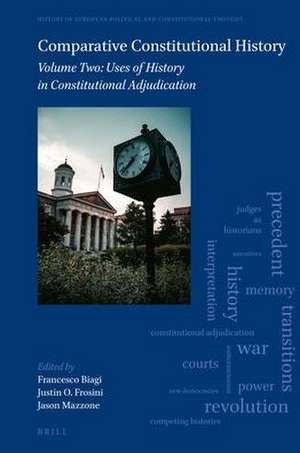Comparative Constitutional History: Volume Two: Uses of History in Constitutional Adjudication: History of European Political and Constitutional Thought, cartea 10
Editat de Francesco Biagi, Justin O. Frosini, Jason Mazzoneen Limba Engleză Hardback – 7 dec 2022
Contributors are: Mark D. Rosen, Jorge M. Farinacci-Fernós, Justin Collings, Jean-Christophe Bédard-Rubin, Cem Tecimer, Ángel Aday Jiménez Alemán, Ana Beatriz Robalinho, Keigo Obayashi, Zoltán Szente, Shih-An Wang, and Diego Werneck Arguelhes.
Preț: 556.04 lei
Preț vechi: 678.09 lei
-18% Nou
Puncte Express: 834
Preț estimativ în valută:
106.40€ • 111.09$ • 88.06£
106.40€ • 111.09$ • 88.06£
Carte indisponibilă temporar
Doresc să fiu notificat când acest titlu va fi disponibil:
Se trimite...
Preluare comenzi: 021 569.72.76
Specificații
ISBN-13: 9789004437050
ISBN-10: 9004437053
Dimensiuni: 155 x 235 mm
Greutate: 0 kg
Editura: Brill
Colecția Brill
Seria History of European Political and Constitutional Thought
ISBN-10: 9004437053
Dimensiuni: 155 x 235 mm
Greutate: 0 kg
Editura: Brill
Colecția Brill
Seria History of European Political and Constitutional Thought
Notă biografică
Francesco Biagi is Senior Assistant Professor of Comparative Public Law at the University of Bologna Department of Legal Studies. His latest publications include: European Constitutional Courts and Transitions to Democracy (Cambridge University Press 2020); “Constitution Drafting After the Arab Spring: A Comparative Overview”, 29 Indiana Journal of Global Legal Studies 1 (2022).
Justin O. Frosini is Associate Professor of Comparative Public Law at the Bocconi University in Milan and Adjunct Professor of Constitutional Law at Johns Hopkins University. He earned his law degree and his doctorate from the University of Bologna. His latest book is Dalla Sovranità del Parlamento alla Sovranità del Popolo. La rivoluzione costituzionale provocata dalla Brexit (Wolters Kluwer-Cedam, 2020).
Jason Mazzone is the Albert E. Jenner, Jr. Professor of Law at the University of Illinois at Urbana-Champaign where he also serves as Director of the Program in Constitutional Theory, History and Law. He earned undergraduate and law degrees from Harvard University and his doctorate from Yale University.
Justin O. Frosini is Associate Professor of Comparative Public Law at the Bocconi University in Milan and Adjunct Professor of Constitutional Law at Johns Hopkins University. He earned his law degree and his doctorate from the University of Bologna. His latest book is Dalla Sovranità del Parlamento alla Sovranità del Popolo. La rivoluzione costituzionale provocata dalla Brexit (Wolters Kluwer-Cedam, 2020).
Jason Mazzone is the Albert E. Jenner, Jr. Professor of Law at the University of Illinois at Urbana-Champaign where he also serves as Director of the Program in Constitutional Theory, History and Law. He earned undergraduate and law degrees from Harvard University and his doctorate from Yale University.
Cuprins
Acknowledgments
List of Tables
Notes on Contributors
Introduction
Francesco Biagi, Justin O. Frosini and Jason Mazzone
Part 1
Framing the Problem
1 History Limit or License in Constitutional Adjudication?
Mark D. Rosen
2 When History Requires the Use of History in Constitutional Adjudication
Jorge M. Farinacci-Fernós
3 Memory as Mantle Evil Pasts and Judges’ Power in Germany and South Africa
Justin Collings
Part 2
Historical Precedents and Inter-constitutional Interpretation
4 Comparing Constitutional Historicities The Case of Precedents in Canada and the United States
Jean-Christophe Bédard-Rubin
5 Inter-constitutional Interpretation A Case Study of the Articles of Confederation
Cem Tecimer
Part 3
A Matter of Narratives
6 Janus’ Third Face? The Spanish Constitutional Court at the Crossroads of History
Ángel Aday Jiménez Alemán
7 Competing Narratives The Use of Historical Arguments in Constitutional Interpretation in Brazil
Ana Beatriz Robalinho
8 Manipulating Constitutional, Legislative and Judicial History Incremental Judicial Activism in the Japanese Supreme Court
Keigo Obayashi
Part 4
New Democracies and Illiberal Regimes
9 How Not to Use History in Constitutional Interpretation The Aborted Resurrection of the Historical Constitution in Hungary
Zoltán Szente
10 Using the Authoritarian Past for Constitutional Interpretation in New Democracies The Example of the Taiwan Constitutional Court
Shih-An Wang
Conclusion Which History, Whose Past?
Diego Werneck Arguelhes
Index
List of Tables
Notes on Contributors
Introduction
Francesco Biagi, Justin O. Frosini and Jason Mazzone
Part 1
Framing the Problem
1 History Limit or License in Constitutional Adjudication?
Mark D. Rosen
2 When History Requires the Use of History in Constitutional Adjudication
Jorge M. Farinacci-Fernós
3 Memory as Mantle Evil Pasts and Judges’ Power in Germany and South Africa
Justin Collings
Part 2
Historical Precedents and Inter-constitutional Interpretation
4 Comparing Constitutional Historicities The Case of Precedents in Canada and the United States
Jean-Christophe Bédard-Rubin
5 Inter-constitutional Interpretation A Case Study of the Articles of Confederation
Cem Tecimer
Part 3
A Matter of Narratives
6 Janus’ Third Face? The Spanish Constitutional Court at the Crossroads of History
Ángel Aday Jiménez Alemán
7 Competing Narratives The Use of Historical Arguments in Constitutional Interpretation in Brazil
Ana Beatriz Robalinho
8 Manipulating Constitutional, Legislative and Judicial History Incremental Judicial Activism in the Japanese Supreme Court
Keigo Obayashi
Part 4
New Democracies and Illiberal Regimes
9 How Not to Use History in Constitutional Interpretation The Aborted Resurrection of the Historical Constitution in Hungary
Zoltán Szente
10 Using the Authoritarian Past for Constitutional Interpretation in New Democracies The Example of the Taiwan Constitutional Court
Shih-An Wang
Conclusion Which History, Whose Past?
Diego Werneck Arguelhes
Index









